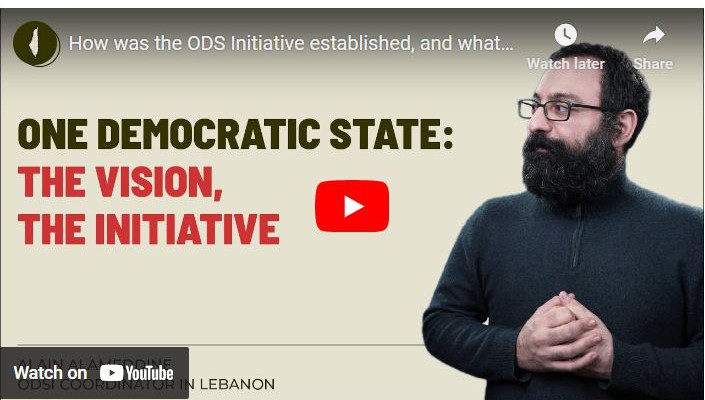The Palestinian One Democratic State Initiative

Fascinating interview that fully explains the Palestinian people’s vision of an inclusive one state solution
The pretext of ‘two states’ and the myth of a “return to 1967 borders” (a fantasy destroyed by constant Israeli colonization of the occupied territories) is maintained to obscure the reality of a predatory apartheid Israeli regime that can never co-exist with an independent Palestine. Washington and the Israelis understand that the fig leaf of ‘two states’ hides apartheid and prevents the construction of a broad anti-apartheid movement. Prof. Tim Anderson
The following conversation answers many questions about why a two state solution for Palestine is dead in the water and that the only viable solution is a democratic ONE Palestinian state that is inclusive of all ethnicities and religions, just as it was pre-1948.
Myriam Faraj interviews another ODSI coordinator, Alain Alameddine, to answer commonly asked questions about ODS, as a political vision and as an initiative.
From the ODSI website:
Politicizing identity fragments societies, which are naturally made of individuals of different identities. It has been at the heart of the European “us vs. them” colonial nation-state model which has oppressed billions of humans over centuries.
Depoliticizing identity and establishing a democratic state that functions as an apparatus to administer the affairs of society rather than a bellicose tool in the hands of an identity against others is the only solution to the occupation, segregation and colonization of Palestine.
Who would be eligible for citizenship or residency in this democratic state?
Although there is no universal consensus on the conditions that define one’s belonging to a society, the principles of jus soli (“right of soil”, the right of an individual born in a territory to be a citizen of its state) and jus sanguinis (“right of blood”, the right of an individual to hold their parents’ citizenship) are commonly applied. Such principles help guarantee that those given the right to participate in the state’s administration of affairs, including the right to self-determination, are those whose interests are directly affected by said state’s administration, rather than individuals belonging to other societies.
Other factors are also taken into consideration as indicators of the individual’s successful integration into society, such as their economic and social integration, respect of the law, owning property, marriage to natives, length of residency and learning the local language. In cases of colonization, another crucial principle comes into play: The individual’s sincere willingness to integrate the existing society as a citizen rather than supplant it as a settler.
In accordance with the above, the following suggestion might be of value: “Palestinian citizenship will be extended to all native Palestinians, including all who were expelled over the past century and their descendants. Citizenship will also be extended to all who were born in Palestine and who wish to become citizens of the new democratic Palestinian state. A law shall facilitate continuing residency for other current residents who wish to remain in Palestine under the sovereignty of the new democratic state and are deemed not to pose any threat to society. At no point shall religious, ethnic, cultural or other identity be a criterion for granting or denying citizenship or residency.”
The legitimacy of a post-colonial democratic state, which breaks free with Zionism’s politicizing of identity, and protects society by establishing a similar break among its residents, prospective citizens and citizens, is thus firmly established.
Why not the two-state proposal?
All evidence points to the fact that Israel never intended for the two-state proposal to succeed:
- David Ben Gurion explicitly stated that “a Jewish state on only part of the land is not the end but the beginning”. Indeed, Israeli plans to annex the West Bank predate 1967
- Oslo architect and signatory Yitzhak Rabin declared that he would grant the Palestinians “less than a state” and ensured that no reference was made to a Palestinian state in the accords he signed
- In the years following the Oslo accord, the colonization of the West Bank has continued, with thousands of housing units being built for Jews, hundreds of Palestinian homes destroyed, thousands of Jews brought in, and thousands of Palestinians displaced. Benjamin Netanyahu reaffirmed that all Palestinians could have was a “state-minus”
The two-state proposal thus seems to have been more about Israel gaining time and hiding the reality of colonialism than about being an actual solution.
More importantly, however, the two-state proposal relies upon the premise that identity should be politicized: Since Palestinians and Jews exist on this land, the land should be partitioned to allow for the establishment of a state for Palestinians and another for Jews. This reproduces the colonial model that views states, not as apparatuses to administer the affairs of society in a certain territory, but as aggressive machines in the hands of a certain identity against others.
The danger of this political vision can be seen in the implications of the establishment of two identitarian states: Cementing the injustice of occupation, dispossession and colonization, further fragmenting society into two groups, institutionalizing this enmity as opposed resolving it by means of a non-segregative democratic state, a denial of the right of return (why would Palestinians return to a Jewish state? Let them return to “their” state), and a door wide open for further ethnic cleansing of Arabs from the Jewish state (why would Palestinians remain in a Jewish state? Let them go to “their” state).
Colonization must be understood for what it is: not the migration of individuals to another land and integrating the indigenous society/polity, but their choosing to supplant the indigenous society/polity with one exclusive to “them”. The question is, therefore, not about the number of states, but about the successful decolonization of Palestine and the triumph of democracy over identitarianism and colonialism.
https://beeley.substack.com/p/the-palestinian-one-democratic-state
 TheAltWorld
TheAltWorld 
0 thoughts on “The Palestinian One Democratic State Initiative”